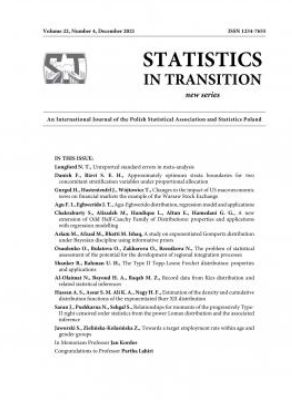An application of a complex measure to model–based imputation in business statistics
An application of a complex measure to model–based imputation in business statistics
Author(s): Andrzej MłodakSubject(s): Business Economy / Management, Methodology and research technology, Accounting - Business Administration
Published by: Główny Urząd Statystyczny
Keywords: complex measure; ratio imputation; regression imputation; predictive mean matching; propensity score method;
Summary/Abstract: When faced with missing data in a statistical survey or administrative sources, imputation is frequently used in order to fill the gaps and reduce the major part of bias that can affect aggregated estimates as a consequence of these gaps. This paper presents research on the efficiency of model–based imputation in business statistics, where the explanatory variable is a complex measure constructed by taxonomic methods. The proposed approach involves selecting explanatory variables that fit best in terms of variation and correlation from a set of possible explanatory variables for imputed information, and then replacing them with a single complex measure (meta–feature) exploiting their whole informational potential. This meta–feature is constructed as a function of a median distance of given objects from the benchmark of development. A simulation study and empirical study were used to verify the efficiency of the proposed approach. The paper also presents five types of similar techniques: ratio imputation, regression imputation, regression imputation with iteration, predictive mean matching and the propensity score method. The second study presented in the paper involved a simulation of missing data using IT business data from the California State University in Los Angeles, USA. The results show that models with a strong dependence on functional form assumptions can be improved by using a complex measure to summarize the predictor variables rather than the variables themselves (raw or normalized).
Journal: Statistics in Transition. New Series
- Issue Year: 22/2021
- Issue No: 1
- Page Range: 1-28
- Page Count: 28
- Language: English

